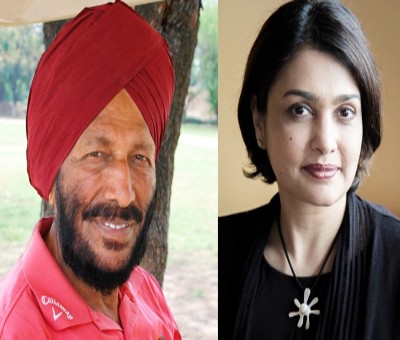
New Delhi, Two men -- the Flying Sikh Milkha Singh and heavyweight freestyle wrestler Lila Ram -- broke India's medal drought in what were then known as the British Empire and Commonwealth Games in Cardiff, Wales, in 1958.
A little over a month before his date with history, Milkha Singh had ended at the top of the podium in the 200m and 400m races at the Tokyo Asian Games, but competing against the sturdy athletes of England, Wales, Scotland, Australia and South Africa, and from the then rising track and field superpowers -- Uganda, Kenya and Jamaica -- appeared to be an insurmountable challenge.
When Singh surprised the world by making it to the final six in the 440 yards event (metric units hadn't yet been introduced in the Games, hence the measurement in yards), the team's American Methodist missionary-turned-athletics coach, Dr Arthur Howard, asked the young athlete to just focus on winning and not even think about the South African favourite, Malcolm Spence.
Singh heeded Howard's advice, clocked 46.6 seconds (thus setting a new national record) and beat Spence, who had taken a sizable early lead, by 0.3 seconds on July 24, 1958, at the packed Cardiff Arms Park. The nation was overjoyed and the Flying Sikh received a rousing reception on his return.
Prime Minister Jawaharlal Nehru joined the national celebrations and, on Singh's request, declared the next day a national holiday!
Unlike Singh, Lila Ram may not ring a bell today, but the man who perfected his wrestling moves at the Grenadiers Regimental Centre, which was then based out of Nasirabad, Rajasthan, became the second wrestler, the first being the bronze medallist Rashid Anwar in 1934, to return home with a medal -- that too gold -- from the British Empire and Commonwealth Games.
Lila Ram, who had earlier captained the Indian wrestling team at the 1956 Melbourne Olympics, spent the rest of his life as chief coach of both the national and the Services team before retiring from the Haryana Government as Assistant Director (Sports) in 1988. Ten years later, in 1998, he was awarded the Padma Shri, an honour conferred upon Milkha Singh much earlier in 1959.
Indian women had to wait for another 40 years after Milkha Singh to win their first gold and the honour was earned by Roopa Unnikrishnan, a Madras Christian College, Chennai, graduate who went on to Oxford (Balliol College and then to the Said School of Business) on a Rhodes Scholarship. She even got a coveted Blue, a rare honour for a shooter at the hallowed university.
At the 1994 Commonwealth Games in Edmonton, Canada, Unnikrishnan settled for silver in the women's 50m small-bore rifle three positions event and also claimed a bronze in the team event with Kuheli Gangulee.
It was in the next edition of the Games in Kuala Lumpur, Malaysia, competing in the 50m rifle prone competition, that she was able to script history. Making it to the final eight, and armed with a four-year-old gun, Unnikrishnan set a new Games record, shooting 590 points, and became the first Indian woman to pick up the prized medal at the Commonwealth Games.
Since then, of course, Indian women have not looked back and returned from the 2018 Gold Coast Commonwealth Games, winning half of the gold medals picked up by the national contingent. Unnikrishnan, meanwhile, moved to New York City, pursued a career in management, motivational speaking and writing, became a U.S. citizen in 2013, and is married to journalism educator and former chief digital officer of the Metropolitan Museum of Art, Sreenath Srinivasan.
Milkha Singh lived much of his life in the public eye and was even the subject of Rakeysh Omprakash Mehra's 2013 film, 'Bhaag Milkha Bhaag', but Roopa Unnikrishnan has settled down comfortably in the anonymity of the corporate world.


.jpeg)

